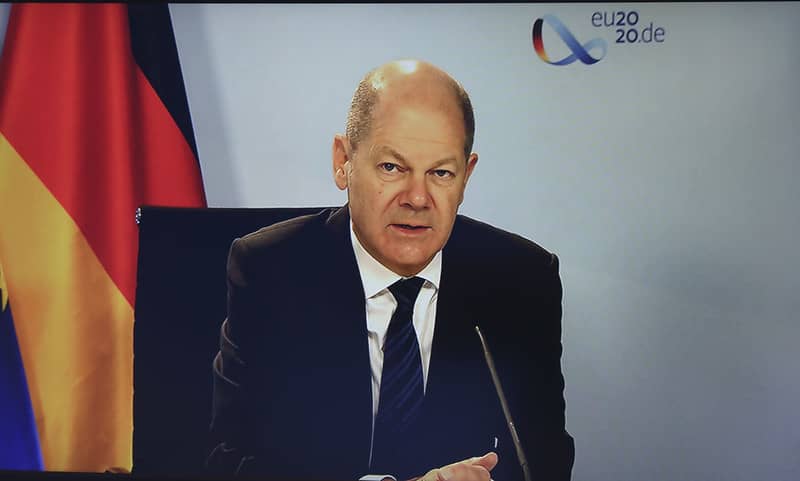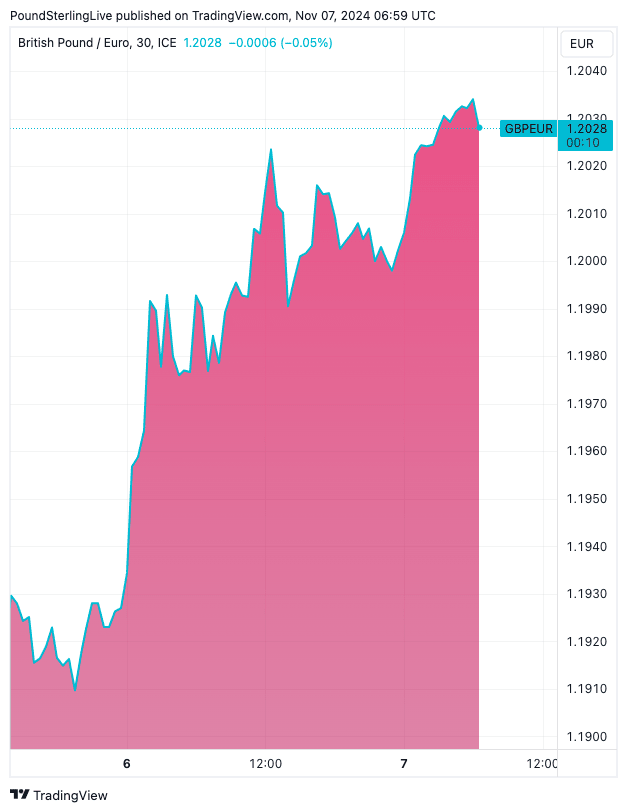
File image of Olaf Scholz. Image: Deutsche Bundesbank.
The Pound to Euro exchange rate (GBP/EUR) extended its foothold above 1.20 after the German government collapsed.
After months of disagreement and disfunction within the governing coalition (Greens, Social Democrats and Liberals), Chancellor Olaf Scholz (Social Democrats) fired Finance Minister Christian Lindner (Liberals).
"The parties failed to compromise on the 2025 budget and were also far apart on which measures to take Germany out of its economic stagnation," says Pia Fromlet, Economist for the Euro Area at SEB Bank. Lindner did not want to abandon the debt brake rule (structural deficit of a maximum of 0.35% of GDP per year).
GBP/EUR is up a quarter of a per cent on the day at 1.2034, having rallied 0.60% the day prior on news Donald Trump had won the U.S. Presidential election.
Trump's win poses headwinds for the Eurozone owing to his desire to strike a hard bargain on U.S.-EU trade. The political uncertainty in Germany, therefore, couldn't come at a more inopportune time.
"Germany's crisis "adds even more salt and pepper to the situation," says Donald Tusk, Poland's President, referencing the geopolitical uncertainties facing the bloc.
"Europe is not strong without a strong Germany," says Roberta Metsola, President of the European Parliament. "We wait for what is inevitable, for a new electoral process in Germany."
Scholz is now facing a confidence vote on January 15 next year, which he will probably lose.
German opposition leader Friedrich Merz has called for snap elections as early as January following
Market anxiety will rest on the outcome of the election as Germany's centrist parties have seen their popularity wane in the post-Merkel era. "Popular dissatisfaction with the government is widespread and has increased support for the parties on the left and right fringes," says Fromlet.
Recent data from Germany suggests the economy is turning a corner. However, a recent spike in electricity and gas prices, as well as fresh political intrigue, might undermine business and consumer confidence heading into year-end.
Euro exchange rates are still recovering from Donald Trump's and his Republican Party's unexpectedly strong performance in the recently held elections.
Markets affixed an approximate 30% chance of a Trump win accompanied by a 'red sweep' in which the Republicans gained control of the Senate and retained control of the House of Representatives.
Results for the House are still coming in, but there is a 90% chance the Republicans will secure the House and, with it, deliver the sweep that will allow Trump to reign supreme.
"The EUR may suffer disproportionately given a potential trade war with the US; this would be especially untimely for an economy still struggling with weak growth," says a note from HSBC. "A further headwind to activity is untimely and suggests the EUR is likely to remain under selling pressure for now."
Economists think the Eurozone, with its strong trade links with the U.S. and China, is particularly at risk of U.S. tariffs. The UK will be impacted, too, but the judgement is that the hit will be less noticeable.
"The single currency's weakness has been attributed to fears of trade wars, which made life noticeably more difficult for Europe during Trump's last presidency. Then, as now, it could be a double whammy: immediate tariffs on European goods and increased pressure on China, reducing demand in the Middle Kingdom and squeezing German exports there," says Alex Kuptsikevich, Chief Market Analyst at FXPro.

